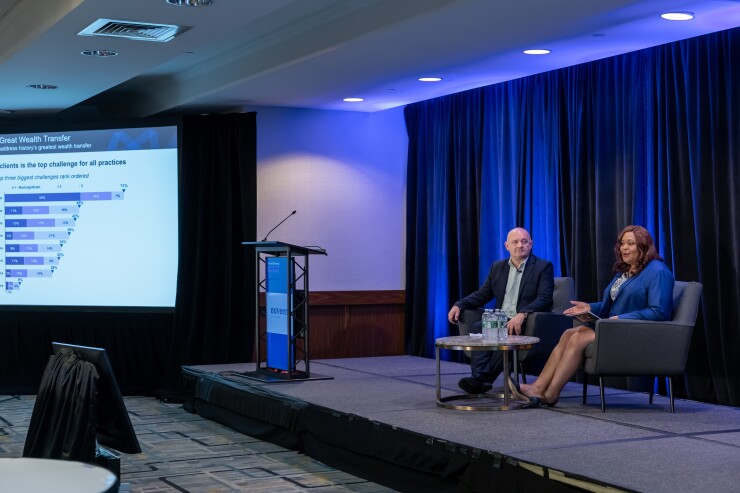Joy Crenshaw believes there are multiple opportunities for advisors to capitalize on the massive transfer of wealth expected to take place over the next two decades.
But
"In fact, in a study (Nuveen) conducted, we found that 64% of inheritors actually stuck with their financial advisor. And then that number shot up to 80% when they were introduced as a child, so they are fertile ground," Crewnshaw said.
"I think we think of millennials as being young and broke, no offense to any millennials in the room. But that's just not the case anymore. I mean, the oldest millennial was 42 years old … so we're really talking about people who are working. They're CEOs, they're running businesses, they are senior leaders," she continued. "So don't rely on the old narrative that they don't want to work with you when they grow up. They do, but you have to make some intentional actions to make sure that you're meeting their needs."
Crenshaw's insight on the great wealth transfer kicked off
Joined on stage at the wealthtech gathering by
READ:
The research was conducted online by Arizent in April among 394 wealth management professionals at a mix of wirehouses, national/regional broker-dealers and RIAs.
The goal of the research is to better understand how financial advisors are addressing the greatest transfer of wealth in U.S. history. Specifically, the research explores whether advisors have the right tools and technology to attract a new cohort of younger customers who will inherit an estimated $73 trillion through 2045, effectively communicate and onboard those clients and build tailored investment portfolios.
Key findings of the upcoming research include just half of those surveyed saying that technology is making it easier to attract younger investors. Despite that, respondents cite the "digital divide" as a barrier to attracting and serving the next generation.
New client acquisition is seen as the greatest growth opportunity for two-thirds of those surveyed, with generational wealth transfer following for 53% of those surveyed.
The generational wealth transfer is also more likely to be seen as a growth opportunity at the largest firms, those with AUM of $1 billion and up, as compared to those with less than $100M in AUM.

The INVEST discussion between Crewnshaw and Moser also covered key practice management goals and challenges facing advisors as they navigate a changing customer landscape; portfolio allocations and investment recommendations financial advisors are making for different customer segments; using AI to build portfolios and investment strategies; and finding the right tools to create sticky relationships with younger clients.
"In asking about transition strategies, we asked … how are you actively engaging with younger clients? And I think one thing sort of pops out (is that) there's no dominant theme like, 'this is the silver bullet,'" Moser said. "Investing in digital tools and Inviting younger family members to relevant meetings. Those are the top two. But beyond that, there's a host of other things advisors are doing."
Keeping with the idea that the old way of thinking does more harm than good, Crenshaw also said the industry should rethink how this customer segment is referred to in order to make their value more apparent.
"I actually think we should change the narrative. I don't really like the concept of younger investors because it puts them in a box," she said. "We should really think of them as our future high net worth clients. And if we make that mindset change, what kind of behavior changes will follow? I think there'll be a lot."
Moser said something else that stood out from the Arizent research is that taking a proactive approach to working with those future high net worth clients makes a big impact. Crensahw agreed, saying that while having things like estate planning and tax services are table stakes, being able to help people with the things they aren't prepared for matters.
She then used her own life as an example, and pointed out a service like elder care being a differentiator.
"This is something that hit me like a ton of bricks. So one day, my dad was living independently and I was helping him on the fringes. Next thing, I'm rushing him to the hospital. And 10 days later, I'm told he cannot be released except for me or to a nursing home," she said. "And I had two days to decide: Change my life, or change my life."
As her father battled a combination of congestive heart failure, cancer and high blood pressure, Crenshaw was suddenly responsible for making complex medical decisions and crucial financial decisions.
At the time of her life change, Crensahw didn't have a financial advisor. But she believes that kind of guidance would have made a world of difference.
"All the time that I spent trying to make decisions, Googling and researching the implications of my decisions, could have been spent actually spending time with my father in this last couple of years of life," she said. "If I had somebody to help me with those decisions, it would have been a better experience for both him and for me, but I didn't have that guidance."







